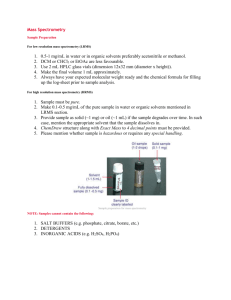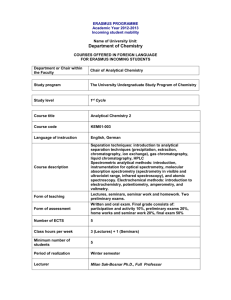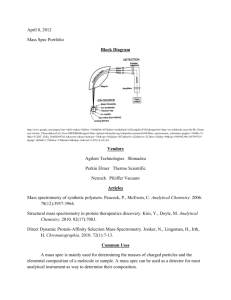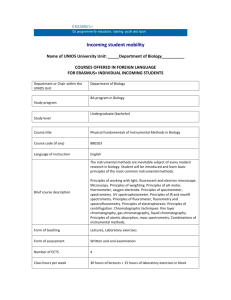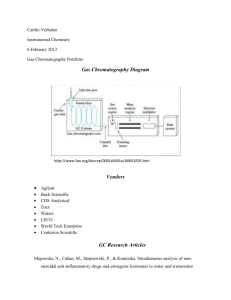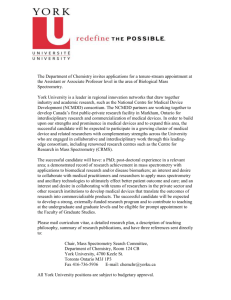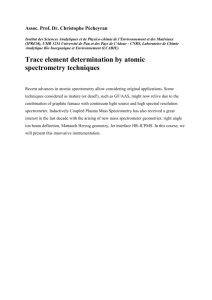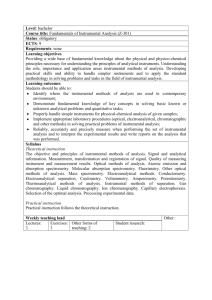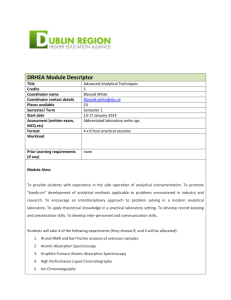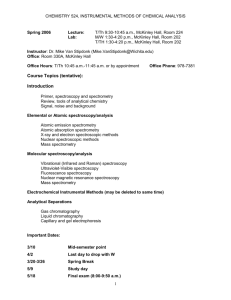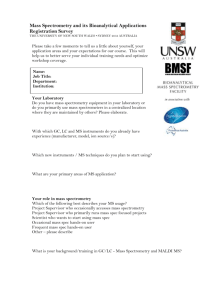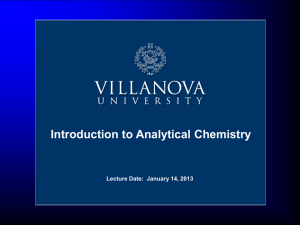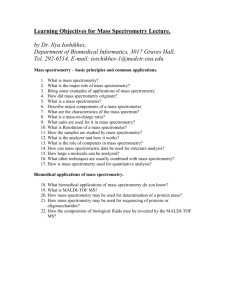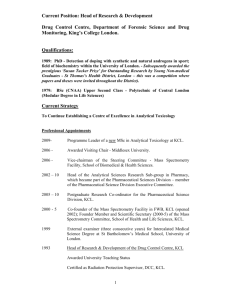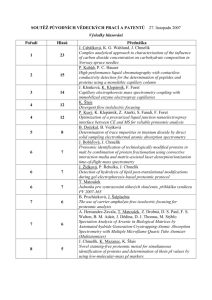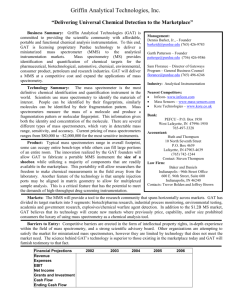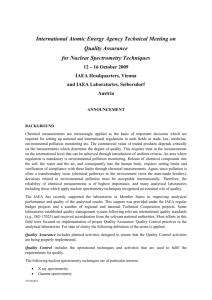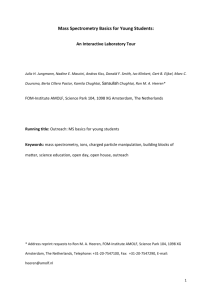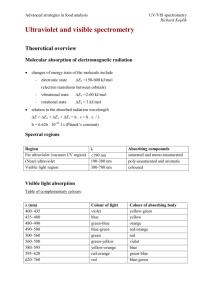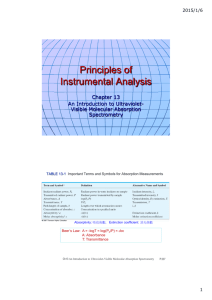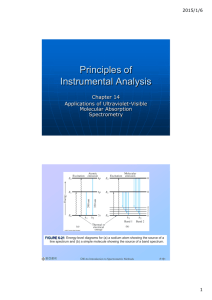chem 4211 instrumental methods in analytical chemistry
advertisement
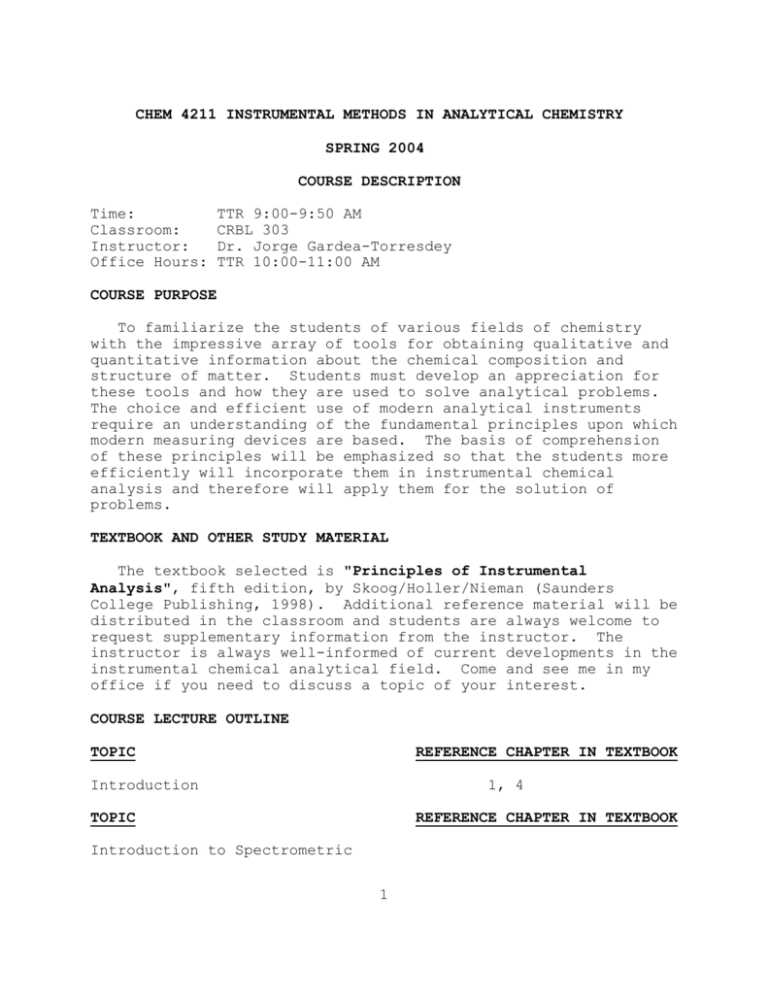
CHEM 4211 INSTRUMENTAL METHODS IN ANALYTICAL CHEMISTRY SPRING 2004 COURSE DESCRIPTION Time: Classroom: Instructor: Office Hours: TTR 9:00-9:50 AM CRBL 303 Dr. Jorge Gardea-Torresdey TTR 10:00-11:00 AM COURSE PURPOSE To familiarize the students of various fields of chemistry with the impressive array of tools for obtaining qualitative and quantitative information about the chemical composition and structure of matter. Students must develop an appreciation for these tools and how they are used to solve analytical problems. The choice and efficient use of modern analytical instruments require an understanding of the fundamental principles upon which modern measuring devices are based. The basis of comprehension of these principles will be emphasized so that the students more efficiently will incorporate them in instrumental chemical analysis and therefore will apply them for the solution of problems. TEXTBOOK AND OTHER STUDY MATERIAL The textbook selected is "Principles of Instrumental Analysis", fifth edition, by Skoog/Holler/Nieman (Saunders College Publishing, 1998). Additional reference material will be distributed in the classroom and students are always welcome to request supplementary information from the instructor. The instructor is always well-informed of current developments in the instrumental chemical analytical field. Come and see me in my office if you need to discuss a topic of your interest. COURSE LECTURE OUTLINE TOPIC REFERENCE CHAPTER IN TEXTBOOK Introduction 1, 4 TOPIC REFERENCE CHAPTER IN TEXTBOOK Introduction to Spectrometric 1 Methods 6 Components of Optical Instruments 7 An introduction to Molecular UV Absorption Spectrometry 13 Applications of UV Absorption Spectrometry 14 Atomic Absorption Spectrometry 8-9 Atomic Emission Spectrometry 10 Atomic Mass Spectrometry 11 An Introduction to Infrared Spectrometry 16 Applications of Infrared Spectrometry 17 Molecular Mass Spectrometry 20 Electroanalytical Chemistry 22-25 (Summary) An Intro. to Chromatographic Separations 26 Gas Chromatography 27 High-Performance Liquid Chromatography 28 Other Separation Methods 29-30 Supplemental Activities If time allows, special topics will be discussed in the class. Problems in most chapters covered in the lecture will be assigned. These problems are for your benefit and it is strongly suggested working through them. The assigned problems will not be graded. In addition, homework which will involve the use of the Internet will be assigned. This work will be related to new developments in chemical instruments, instruments manufacturers and costs. These assignments will constitute 10% of the final grade. EXAMS There will be three written examinations, each one class period long (except the final exam). The examinations will cover 2 the subjects of the preceding classes. The final examination will be comprehensive. The tentative dates for the examinations will be February 17, March 30, and May 4. The grading will be as follows: First exam Second exam Third exam Internet Homework 30% 30% 30% 10% The overall grade will be determined by performance and competency. There will be a "grading scale" and it will be determined at the end of the spring semester. This scale will be based on the distribution of the total scores for the class as a whole in a similar fashion to a "curve". However, this is not to be interpreted exactly as a "curve". The following scale (which is subjected to change) is to be used as a general guideline: Scale 91-100 81-90 71-80 61-70 0-60 Grade A B C D F NOTE: Excessive unexcused absences will prove to be detrimental to the student's performance in the course. Student participation in the class is encouraged. Your instructor is available for help and advice in his office, room 201, PSCI Building. My phone number is 747-5359 (e-mail, jgardea@utep.edu). CAVEAT: THE COURSE OUTLINE IS SUBJECT TO SLIGHT VARIATION WITHOUT PRIOR NOTICE. 3 4
